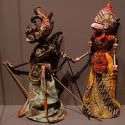
Government and Politics
 Indonesia is a republic with a presidential system. As a unitary state, power is concentrated in the central government. Following the resignation of President Suharto in 1998, Indonesian political and governmental structures have undergone major reforms. Four amendments to the 1945 Constitution of Indonesia have revamped the executive, judicial, and legislative branches. The president of Indonesia is the head of state, commander-in-chief of the Indonesian Armed Forces, and the director of domestic governance, policy-making, and foreign affairs. The president appoints a council of ministers, who are not required to be elected members of the legislature. The 2004 presidential election was the first in which the people directly elected the president and vice president. The president may serve a maximum of two consecutive five-year terms. A session of the People's Representative Council in Jakarta
Indonesia is a republic with a presidential system. As a unitary state, power is concentrated in the central government. Following the resignation of President Suharto in 1998, Indonesian political and governmental structures have undergone major reforms. Four amendments to the 1945 Constitution of Indonesia have revamped the executive, judicial, and legislative branches. The president of Indonesia is the head of state, commander-in-chief of the Indonesian Armed Forces, and the director of domestic governance, policy-making, and foreign affairs. The president appoints a council of ministers, who are not required to be elected members of the legislature. The 2004 presidential election was the first in which the people directly elected the president and vice president. The president may serve a maximum of two consecutive five-year terms. A session of the People's Representative Council in JakartaThe highest representative body at national level is the People's Consultative Assembly (MPR). Its main functions are supporting and amending the constitution, inaugurating the president, and formalizing broad outlines of state policy. It has the power to impeach the president. The MPR comprises two houses; the People's Representative Council (DPR), with 550 members, and the Regional Representatives Council (DPD), with 128 members. The DPR passes legislation and monitors the executive branch; party-aligned members are elected for five-year terms by proportional representation. Reforms since 1998 have markedly increased the DPR's role in national governance. The DPD is a new chamber for matters of regional management.
Most civil disputes appear before a State Court; appeals are heard before the High Court. The Supreme Court is the country's highest court, and hears final cassation appeals and conducts case reviews. Other courts include the Commercial Court, which handles bankruptcy and insolvency; a State Administrative Court to hear administrative law cases against the government; a Constitutional Court to hear disputes concerning legality of law, general elections, dissolution of political parties, and the scope of authority of state institutions; and a Religious Court to deal with specific religious cases. (source)
Related articles :



















0 comments:
Post a Comment